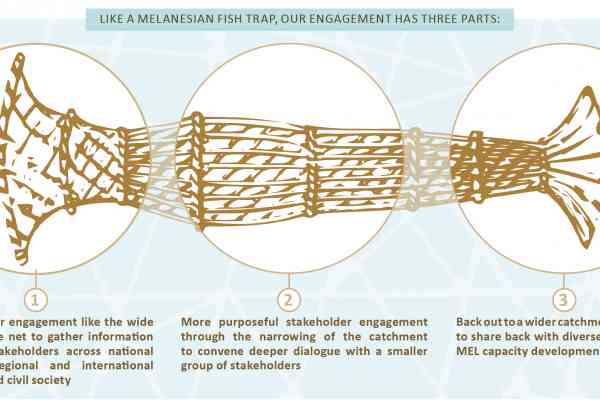More than 50 participants from around the Pacific came together in Nadi, Fiji, 6 to 8 August for the inaugural Pacific Monitoring, Evaluation and Learning (MEL) Convening. The group made a collective call for greater investment in Pacific MEL and highlighted the underappreciated value that MEL can bring to development strategies for the region.
Improving the quality of evidence-based policy decisions is essential to strengthening governance and sustainable development. Many of the current efforts towards improving MEL practice in the Pacific are centred around discrete workshops which often rely on expertise from outside of the region and fail to incorporate the practical realities of working in the Pacific. This Convening took a step towards correcting the imbalance and ensuring that MEL practices for the Pacific were guided by the Pacific.
Participants from the Convening committed to establishing a community of practice, which they have agreed to call Solesolevaki, while development partners, including the Asian Development Bank (ADB), New Zealand Ministry of Foreign Affairs and Trade (MFAT), UNICEF and the World Bank, created their own set of targets with the Duvata Statement.
“As Pacific island organisations, we remain connected to each other by our vast Pacific Ocean and this awareness was critical to informing the methodology of the convening” said the Head of the Strategy, Performance and Learning at the Pacific Community, Emily Sharp.
The Convening agreed to organize a follow-up session later in the year and launch a Regional Rebbilib for MEL capacity strengthening in early 2020. More immediately, there was for call to leaders, who are currently convening in Tuvalu to support MEL in the Pacific.
Participants to this historic gathering included representatives from ten national governments, civil society organizations, regional and international development organisations, and donor partners. Together they used Talanoa learnings and the Kakala research work to construct Rebbilib maps drawn from MEL challenges, strengths, needs and opportunities with MEL Master Navigators helping to guide the process.
A large focus of the meeting was ensuring than a Pacific voice and relevance remained prominent, and that the Convening would be developed by and for the Pacific to ensure a contextually relevant and culturally appropriate Pacific MEL process was adopted.
An outcomes document with the shared Rebbilib and guidance notes will be available to Pacific MEL practitioners and participants who are encouraged to guide their peers in navigating their own MEL capacities and contribute towards the Regional Rebbilib for MEL capacity strengthening in the Pacific.
The Pacific MEL convening was facilitated by the Pacific Community (SPC) and Better Evaluation (BE) with the support of the New Zealand Government through its Ministry of Foreign Affairs and Trade (MFAT).
Media contact:
Emily Sharp, Head of Strategy Performance and Learning (SPL), Pacific Community (SPC) | [email protected]
Meeting terminology
The Talanoa refers to story telling and is widely used across the Pacific. Small group sizes help create a safe and trusted space for open and honest sharing.
The Kakala refers to the process of garland making in Tonga. As a research framework, this methodology provided the foundation to co create a functional, appropriate and locally owned Pacific MEL convening.
The Rebbilib is a summary stick chart unique to the Marshall Islands. As one of many navigation charts, it was utilized to help participants map and chart their individual and organizational MEL journeys (against 10 MEL sub-domains), aimed at arriving at a Regional MEL Rebbilib.
